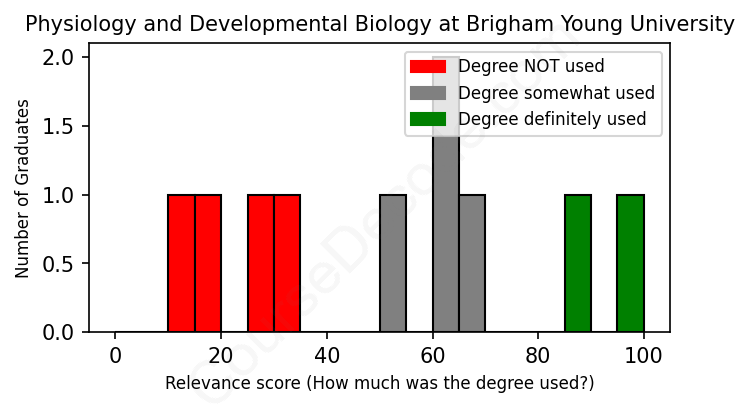
First, some facts. Of the Physiology and Developmental Biology graduates from Brigham Young University we've analyzed , here's how many have used (or NOT used) their degree in their career:

These are estimates based on AI analysis of 10 LinkedIn profiles (see below).
The verdict? Significantly below average. Overall, with an average relevance score of 51%, Physiology and Developmental Biology graduates from Brigham Young University have a much lower likelihood (-16%) of finding work in this field compared to the average graduate across all fields:
And for comparison, here's the chart for all profiles we've looked at across all degrees.
Also, after graduating, 70% of these graduates have pursued further education other than another Bachelor's degree (such as a Masters degree or other), compared to the average across all profiles of 35%. This suggests you may need more than just a Bachelors degree to be competitive as a Physiology and Developmental Biology graduate.
See the details:
|
Relevance score: 85% We think this person has gone into a career highly relevant to their degree. We think this person has gone into a career highly relevant to their degree.
DEGREE INFOGraduated in 2017 from Brigham Young University with a Bachelor of Science (BS) in Physiology and Developmental Biology. Also pursued further education since (see below). JOB HISTORY SINCE GRADUATIONCertified Nursing Assistant A Caring Hand Jan 2017 - Apr 2017 Patient Care Technician  Intermountain Medical Center May 2017 - Aug 2017 Medical Assistant  Revere Health Aug 2017 - Apr 2018 Physician Assistant Certified  Canyon View Medical Group Oct 2020 - Jun 2022 Physician Assistant Certified  Huntsman Cancer Institute Jul 2022 - Present FURTHER DEGREES DONE SINCE GRADUATINGMaster of Physician Assistant StudiesRocky Mountain University of Health Professions 2018 - 2020 ABOUTGynecologic Oncology Physician Assistant at Huntsman Cancer Hospital. Passionate about providing quality health care and empowering women. |
The top 10 most common jobs done by the graduates we've analyzed (ranked most common to least) are:
When looking through the LinkedIn profiles of individuals who graduated with a degree in Physiology and Developmental Biology from Brigham Young University, it’s pretty clear that many of them ended up in jobs that aren't directly related to their field of study. A good chunk took on roles in technology and business, such as Technology Service Technicians or Business Analysts, which mostly focus on technical skills or business processes rather than anything involving physiology or biology. Although there are some roles, like Assistant Professor or Epidemiologist, where the knowledge from their degree is definitely put to good use, they seem to be outnumbered by positions that don’t relate much at all.
That said, there are certainly exceptions. Some graduates pursued careers in healthcare, such as Physical Therapists or Physician Assistants, where their understanding of physiology and developmental biology is crucial. It's interesting to note that while many found themselves in unrelated fields, those who stayed within the healthcare path clearly benefited from their degree. Overall, it seems that while the Physiology and Developmental Biology degree provides a solid foundation, not every job reflects that expertise, and many graduates have taken a very different route, ending up in roles where their education is less applicable.
Here is a visual representation of the most common words in job titles for Physiology and Developmental Biology graduates (this is across all Physiology and Developmental Biology graduates we've analyzed, not just those who went to Brigham Young University):

Looking at the career paths of graduates from the Physiology and Developmental Biology program at Brigham Young University, it seems like there's a mix of outcomes. Many of the early jobs taken right after graduation relate to healthcare in some way, such as being a medical assistant, physical therapy aide, or working in roles like epidemiology or research. However, it's also common to see graduates veering off into fields like technology support, sales, or roles in business and consulting. This might suggest that while they start with a focus on health and biology, many feel the pull to diversify into other industries.
As for where these graduates are 5 to 10 years down the line, there's a noticeable trend toward more specialized and impactful roles in healthcare and related fields. Some have transitioned into significant positions like pediatricians or epidemiologists, which are closely aligned with their studies. Others have moved into managerial or analytical roles within health systems or even into business consulting. Yet, it’s clear that not everyone sticks with careers directly tied to Physiology and Developmental Biology. There are quite a few who have taken jobs far removed from healthcare, indicating that while the degree offers a strong foundation for medical and research careers, it also provides the flexibility to explore various other paths. Overall, this program can certainly open doors, but the graduates seem to forge unique paths, often diverging from the expected outcomes in biology or health sciences.
Getting a Bachelor’s degree in Physiology and Developmental Biology, especially at a university like BYU, can definitely be challenging—probably harder than a lot of other majors. It dives deep into complex subjects like human anatomy, cellular processes, and developmental genetics, so you’ll need to be ready for some serious coursework and a fair bit of studying. The program usually involves lab work and plenty of exams that can be tough, but if you’re passionate about the subject and willing to put in the time, it can also be really rewarding. Overall, it’s one of those degrees that takes commitment, so if you're up for the challenge, you might find it really engaging!
Most commonly, in the LinkedIn profiles we've looked at, it takes people 6 years to finish a Bachelor degree in Physiology and Developmental Biology.
Looking at all these grads from BYU, it seems like they've had a mix of jobs that could bring in decent money depending on their roles and the companies they worked for. Some have landed pretty solid positions, like the epidemiologists and the pediatricians, who are likely making good salaries now that they're in more specialized fields. Others, like those in tech support or entry-level roles, probably started off with lower pay, but they seem to be moving up over time, which is a good sign. Overall, there are definitely opportunities for them to make good money, especially with their education and experience, but it really varies from person to person.
Here is a visual representation of the most common words seen in the "about" section of LinkedIn profiles who have a Bachelor degree in Physiology and Developmental Biology (this is across all Physiology and Developmental Biology graduates we've analyzed, not just those who went to Brigham Young University). This may or may not be useful:

Here are all colleges offering a Bachelor degree in Physiology and Developmental Biology (ordered by the average relevance score of their Physiology and Developmental Biology graduates, best to worst) where we have analyzed at least 10 of their graduates:
| College | Score | Count |
|---|---|---|
 Brigham Young University Brigham Young University
|
51 | 10 |